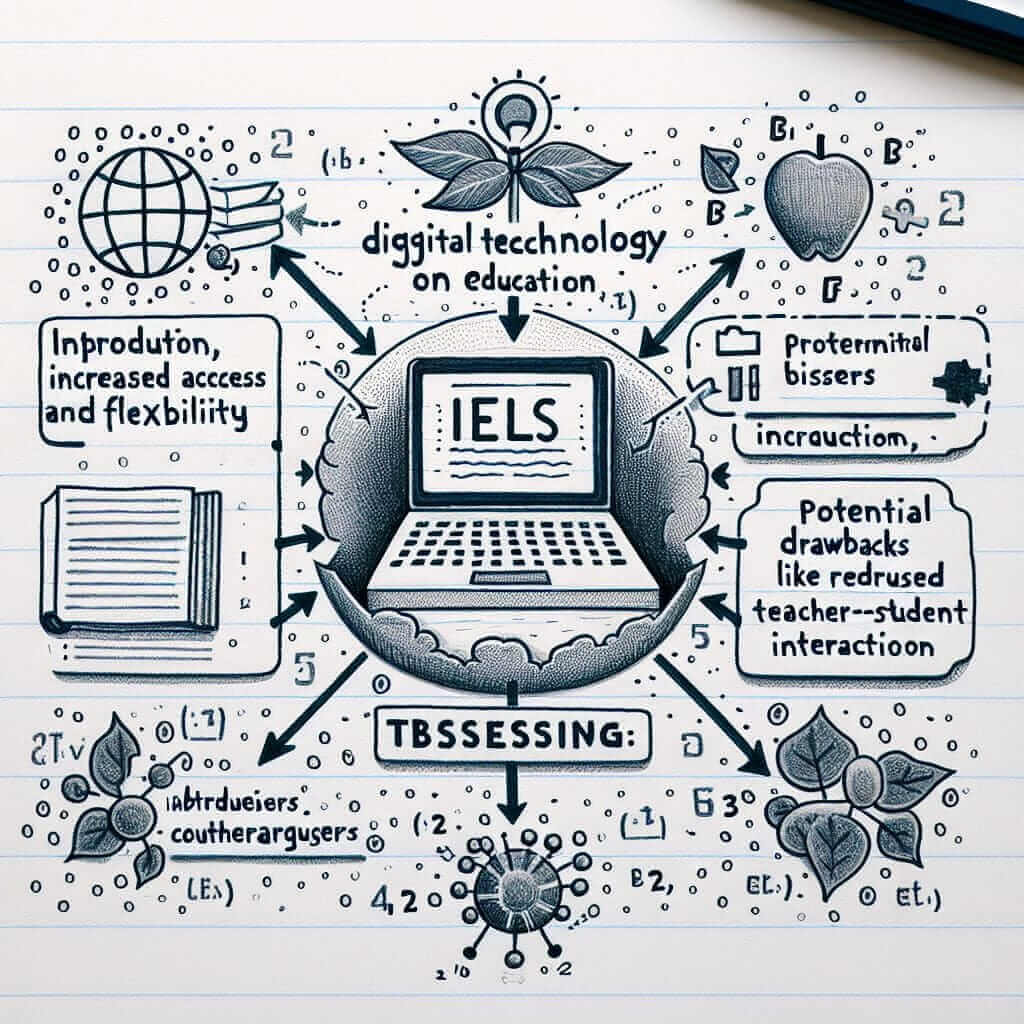The IELTS Writing section can be a challenging hurdle for many test-takers. It demands not only a strong grasp of English grammar and vocabulary but also the ability to articulate your thoughts clearly and effectively within a limited timeframe. As an IELTS instructor with over two decades of experience, I’ve witnessed countless students struggle with this section. But don’t worry! With the right strategies and consistent effort, you can significantly improve your writing skills and boost your IELTS score.
Understanding the IELTS Writing Tasks
The IELTS Writing test comprises two tasks, each requiring a different style of writing:
Task 1 (Academic)
- Description: You’ll be presented with a visual representation of data, such as a graph, chart, table, or diagram. Your task is to summarise the key information and trends presented in the visual, using your own words.
- Length: At least 150 words.
- Time: 20 minutes.
Task 2 (General Training & Academic)
- Description: You’ll be given an essay prompt that presents a point of view, argument, or problem. Your task is to respond to the prompt by providing your own opinion, supporting it with relevant examples and evidence.
- Length: At least 250 words.
- Time: 40 minutes.
Effective Strategies to Elevate Your Score
1. Master Grammar and Vocabulary: The Foundation of Strong Writing
- Grammar Essentials: A solid understanding of English grammar is non-negotiable. Pay attention to:
- Tenses: Use the appropriate tense consistently throughout your writing.
- Subject-verb agreement: Ensure your verbs agree in number with their subjects.
- Articles: Use articles (a, an, the) correctly.
- Sentence structure: Vary your sentence structure to avoid monotony. Use a mix of simple, compound, and complex sentences.
- Vocabulary Enhancement:
- Read Widely: Immerse yourself in English texts—news articles, novels, opinion pieces—to expand your vocabulary.
- Learn Synonyms and Paraphrasing: Don’t repeat the same words or phrases. Use synonyms and paraphrasing to demonstrate your language flexibility.
- Academic Language: Familiarize yourself with academic vocabulary, particularly for Task 1, where you’ll need to describe trends and data accurately.
2. Develop Coherence and Cohesion
- Clear Paragraphing: Structure your writing in well-defined paragraphs. Each paragraph should focus on a single main idea.
- Topic Sentences: Begin each body paragraph with a clear topic sentence that outlines the paragraph’s main point.
- Linking Words and Phrases: Utilize a range of linking words and phrases (e.g., however, furthermore, in addition, consequently) to connect your ideas smoothly and logically.
3. Task-Specific Strategies
Task 1: Data Analysis and Reporting
- Identify Key Features: Carefully analyze the visual and identify the most significant trends, patterns, or outliers.
- Paraphrase the Question: Don’t simply copy the words from the task prompt. Rephrase it in your own words in the introduction.
- Data Accuracy: Report the data accurately, paying close attention to units of measurement and time periods.
- Comparisons and Contrasts: Highlight any significant comparisons or contrasts within the data.
Task 2: Essay Writing
- Plan Before You Write: Spend a few minutes brainstorming ideas and planning your essay structure before you start writing.
- State Your Position Clearly: Introduce your stance on the topic in the introduction and maintain a consistent viewpoint throughout the essay.
- Support Your Arguments: Provide relevant examples and evidence to support your claims. Avoid making generalisations.
- Acknowledge Counterarguments: Consider opposing viewpoints and address them briefly. This shows a deeper understanding of the issue.
4. Practice Makes Perfect
- Regular Writing Practice: The more you write, the more comfortable you’ll become with the format and time constraints of the IELTS Writing test.
- Use Official IELTS Materials: Practice with past IELTS papers or official sample questions to get familiar with the test format and expectations.
- Seek Feedback: Have your writing evaluated by an experienced IELTS instructor or tutor who can provide valuable feedback and areas for improvement.

Example: Analyzing an IELTS Writing Task 2 Prompt
Prompt:
“Some people believe that it is more important to protect the environment than to address poverty. To what extent do you agree or disagree?”
Brainstorming and Planning:
- My stance: I disagree; both issues are equally important and interconnected.
- Argument 1: Addressing poverty can alleviate environmental damage caused by desperation (e.g., deforestation for fuel).
- Argument 2: Environmental degradation disproportionately impacts the poor (e.g., lack of access to clean water).
Essay Outline:
- Introduction: Introduce the topic, state your disagreement, and briefly outline your arguments.
- Body Paragraph 1: Explain how addressing poverty can have positive environmental consequences. Provide examples.
- Body Paragraph 2: Discuss how environmental problems exacerbate poverty and inequality. Give examples.
- Conclusion: Restate your disagreement and summarise your main points.
Final Tips for Success
- Time Management: Allocate your time wisely between the two tasks. Don’t spend too much time on Task 1, as Task 2 carries more weight.
- Proofreading: Leave a few minutes at the end to review your work for any grammatical errors, spelling mistakes, or unclear expressions.
- Stay Calm and Focused: Nerves can impact your performance. Take deep breaths and try to stay calm and focused during the exam.
Remember, improving your IELTS Writing score is a journey. Be patient with yourself, stay persistent in your efforts, and celebrate your progress along the way.